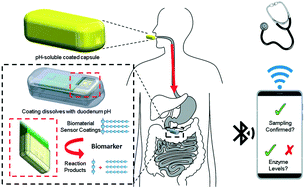Capacitive sensing of triglyceride film reactions: a proof-of-concept demonstration for sensing in simulated duodenal contents with gastrointestinal targeting capsule system†
Abstract
Ingestible capsule systems continue to evolve to overcome drawbacks associated with traditional gastrointestinal (GI) diagnostic and therapeutic processes, such as limitations on which sections of the GI tract can be accessed or the inability to measure local biomarker concentrations. We report an integrated capsule sensing system, utilizing a hybrid packaging scheme coupled with triglyceride film-coated capacitive sensors, for measuring biochemical species present in the duodenum, such as pancreatic lipase and bile acids. The system uses microfabricated capacitive sensors interfaced with a Bluetooth low-energy (BLE)-microcontroller, allowing wireless connectivity to a mobile app. The triglyceride films insulate the sensor surface and react either with 0.01–1 mM lipase via hydrolysis or 0.07–7% w/v bile acids via emulsification in simulated fluids, leading to measurable changes in capacitance. Cross reactivity of the triglyceride films is evaluated in both phosphate buffered saline (PBS) as well as pancreatic trypsin solutions. The film morphology is observed after exposure to each stimulus to better understand how these changes alter the sensor capacitance. The capsule utilizes a 3D-printed package coated with polymers that remain intact in acid solution (mimicking gastric conditions), then dissolve at a duodenum-mimicking neutral pH for triggered opening of the sensing chamber from which we can subsequently detect the presence of pancreatic lipase. This device strategy represents a significant step towards using embedded packaging and triglyceride-based materials to target specific regions of the GI tract and sensing biochemical contents for evaluating gastrointestinal health.



 Please wait while we load your content...
Please wait while we load your content...